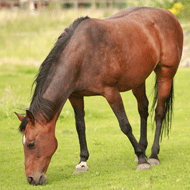Calls for change in the Year of the Horse

The RSPCA is calling for greater enforcement of microchipping and passport legislation.
With the Chinese New Year marking the start of the Year of the Horse, the RSPCA is calling for changes to improve equine welfare.
According to the charity, it saw a 69 per cent rise in the number of horses rescued or taken in during 2013, compared to the previous year.
David Bowles, RSPCA head of public affairs, said: "2013 wasn't a good year for horse welfare. We've been out to thousands of horses that have been left abandoned or fly grazed, many of which are the victims of the rising cost of feed and care combined with a drop in the price they can fetch at market.
"This means that irresponsible owners often leave their animals to breed indiscriminately and fail to provide them with even the most basic level of care."
The charity says it rescued, collected or took in 1,526 equines last year, compared to 901 in 2012. Cases in 2013 included a number of incidents involving multiple horses, some of which had been left without sufficient food and water or veterinary treatment, as well as other groups at risk from rising flood water.
Despite some grim figures, 2013 also saw the introduction of new legislation in Wales to tackle fly grazing and abandonment. The RSPCA has urged Westminster to introduce similar legislation to ensure the problem does not simply cross the border.
Mr Bowles added: "We still want to see greater enforcement of microchipping and passport legislation so we can identify those horses left to graze on other peoples' land."
The new Welsh law came into force last week, giving local authorities powers to tackle fly grazing and abandonment. The move has been welcomed by many equine charities, although there are concerns that it will lead to a rise in problems in England if Westminster does not take similar steps.



 The Federation of Independent Veterinary Practices (FIVP) has announced a third season of its podcast, Practice Matters.
The Federation of Independent Veterinary Practices (FIVP) has announced a third season of its podcast, Practice Matters.